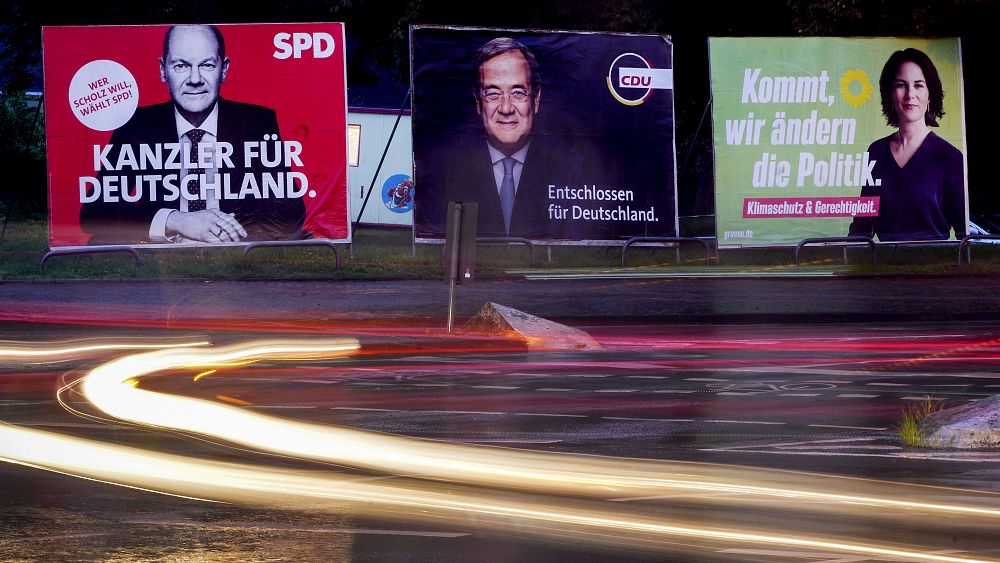
Germans will go to the polls on Sunday (September 26) in a pivotal election that will determine Angela Merkel’s successor.
Despite dissatisfaction with the current government, the chancellor remains the most popular politician in Germany after nearly 16 years in office.
The issues driving the election include her tenure, climate, and the recent COVID-19 crisis.
Here’s a look at five charts to help better understand voters’ intentions and concerns ahead of the election.
How are German voters intending on voting in the election?
Germans currently favour the Social Democratic Party (SPD) and chancellor candidate Olaf Scholz, who has been rising in popularity among voters since August.
“We’ve seen a huge comeback, both for Olaf Scholz and for the SPD,” explained Jana Puglierin, head of the European Council of Foreign Relations’ Berlin office.
“Nobody had them in the cards when talking about future coalitions. For a long time, it seemed to be a given that it [would] be the Conservatives for sure, most likely with the Greens,” she added.
Although outgoing Chancellor Angela Merkel remains the most popular politician in Germany, her successor at the helm of the Christian Democratic Union (CDU), Armin Laschet, is much less popular, ranking poorly compared to other politicians.
A September 2021 poll from Germany’s public broadcaster showed that the SPD’s Scholz was the second most popular politician in the country after Angela Merkel. Scholz currently serves as Merkel’s vice-chancellor.
Armin Laschet, who leads the CDU, was ranked tenth on the list, according to the Infratest Dimap/ARD DeutschlandTrend poll.
Voters are “very much looking for somebody who is very experienced, who can, let’s say, continue the policy of Ms Merkel,” said Dr Horst Lochel, Professor of Economics at Frankfurt School of Finance and Management.
Lochel said that particularly following the COVID-19 crisis and Afghanistan withdrawal, voters are searching for stable leadership and seem to believe that Scholz represents that.
What are the top election issues for voters?
The top election issues, according to polls, include the environment, immigration, and the COVID-19 crisis.
The environment and climate change are issues that have increased in importance since flooding in July 2021 killed nearly 200 people.
According to the September Infratest Dimap/ARD DeutschlandTrend poll, climate increased by five percentage points as the most important political problem to solve for German voters between June and September 2021.
Immigration has long been an important topic in Germany, especially in the wake of the 2015 refugee crisis. Angela Merkel’s CDU lost 65 seats in the 2017 election due in part to their immigration stance.
The refugee crisis also lead to the rise of the far-right Alternative for Germany (AfD). In an annual poll discussing Germans’ biggest fears, Germany being “overwhelmed by refugees” ranked fourth.
But residents in Eastern German states were much more likely to fear the state would be overwhelmed by refugees or that an influx of foreigners would create tension, the poll showed.
Overall Germans were most worried about tax increases or a reduction in benefits due to the COVID-19 crisis as well as a rising cost of living in the country.
Prof Dr Manfred G. Schmidt, a political scientist at the Ruprecht-Karls-University in Heidelberg, explained that Germans are worried about rising national debt due to the COVID-19 crisis.
“The national debt, which has grown considerably as a result of coronavirus, requires considerable increases in taxes or significant cuts in public services, or both – permanently,” Schmidt said in a statement when the study was released.
“The majority of those surveyed see that with absolute clarity.”
The poll also showed that Germans’ concerns about the environment and climate change increased significantly following the July floods in North Rhine Westphalia and Rhineland-Palatinate.
Concern for natural disasters and climate change increased by more than 20 percentage points directly following the flooding.

Hackdra is a cyber security company that can provide smart contract auditing, pen-testing, bug bounty, blockchain, web3, DeFi, NFT, and ARM services with AI.